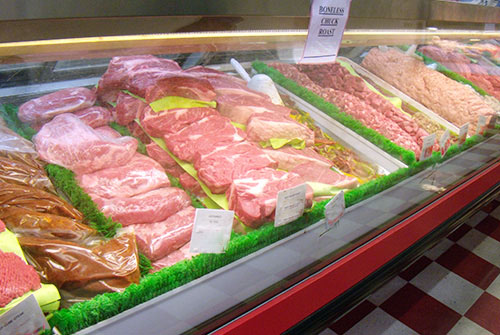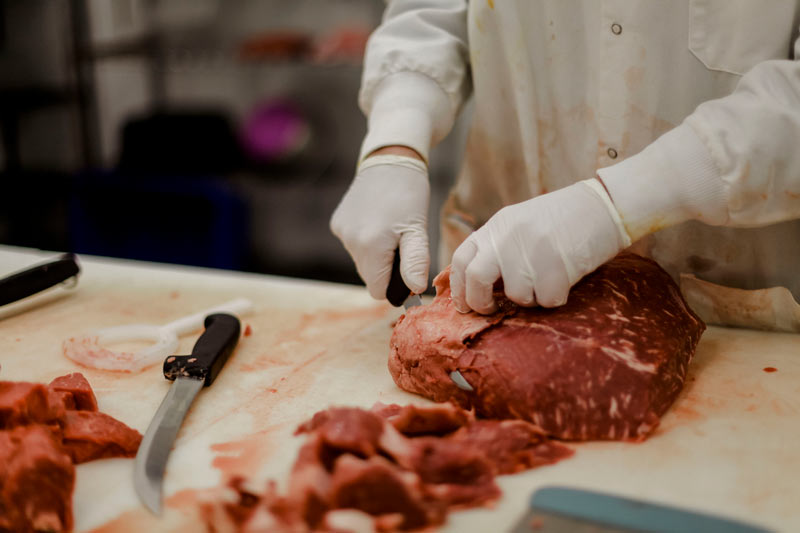Why Buying at a Neighborhood Meat Market Guarantees Fresh, High-Quality Cuts
Buying at a neighborhood meat market uses unique benefits that typically go unnoticed by consumers accustomed to bigger retail chains. The ramifications of choosing local prolong beyond prompt benefits, motivating a better examination of what this choice really suggests for both consumers and the local economic climate.
Benefits of Local Sourcing
In the realm of food purchase, the advantages of local sourcing attract attention plainly. By purchasing meat from regional markets, customers obtain straight access to items that are typically fresher and extra savory than those found in larger, industrial grocery stores. Regional sourcing minimizes the moment and distance food travels from farm to table, which not only improves taste however also protects nutritional worth.

Furthermore, neighborhood sourcing usually offers openness pertaining to the origins of the meat. Consumers can ask about the farming practices utilized, pet well-being requirements, and whether the meat is grass-fed or natural. This information equips customers to make educated choices aligned with their values.
Quality Control Specifications
Regional meat markets often stick to rigorous top quality control criteria that make certain the products provided fulfill high security and quality benchmarks. These requirements usually encompass different stages of the meat production process, from sourcing to dealing with and storage.
First, regional markets frequently develop rigorous supplier requirements, ensuring that only credible farms and manufacturers are used - bagley meat market edwardsville il. This reduces the likelihood of contamination and promotes greater pet welfare criteria. Furthermore, numerous neighborhood meat markets apply routine examinations to confirm that the meat is refined under hygienic problems, additionally lessening wellness dangers
Temperature control is another critical facet of top quality assurance. Local meat markets frequently check refrigeration systems to keep optimal storage temperature levels, making certain that meat stays secure and fresh for consumption. The execution of traceability systems permits markets to track the origin of their products, offering openness and responsibility.
Lastly, personnel at neighborhood meat markets are usually trained to recognize indicators of spoilage and understand proper handling methods. This dedication to quality control not only boosts the general criterion of the meat yet additionally fosters consumer trust fund, making neighborhood meat markets a trustworthy resource for high-quality cuts.
Sustaining Neighborhood Farmers
Sustaining local farmers is necessary for cultivating a sustainable food system and enhancing community durability. When customers select to shop at regional meat markets, they straight add to the source of incomes of farmers in their area. This not only supports the local economy but likewise strengthens the agricultural market, guaranteeing that it remains viable and vibrant.


Moreover, sustaining regional farmers cultivates a sense of community and link in between manufacturers and customers. It motivates openness in food sourcing and imparts depend on, as customers can create relationships with the people who increase their food. This straight link inevitably leads to an extra that site involved and notified public, which is crucial for promoting for sustainable farming techniques in the future.
Lasting Practices
Sustainable methods in meat markets play an essential role in advertising environmental stewardship and making certain animal well-being. Regional meat markets often prioritize sourcing their products from farms that carry out moral and lasting farming techniques. These methods include rotational grazing, which helps preserve soil health and wellness and minimizes carbon discharges, along with reducing using anti-biotics and hormones in livestock.
In addition, local meat markets normally highlight transparency in their supply chains. Clients are supplied with info relating to the beginning of their meat, permitting them to make enlightened choices that align with their worths. By sustaining local farmers who exercise lasting methods, consumers add to the preservation of biodiversity and the decrease of transport discharges connected with long-distance meat distribution.
In addition, several regional meat markets participate in waste reduction strategies, such as making use of every component of the animal and promoting off-cuts that may or else go unsold. By fostering a more sustainable approach to meat intake, these markets not just give high-grade products however additionally add positively to the setting and animal well-being. Fundamentally, shopping at a neighborhood meat market aligns customers with a more comprehensive movement towards responsible and ethical food sourcing.
Personalized Customer Care
Shopping at a meat market typically encompasses greater than simply the items used; it is additionally concerning the experience and the relationships developed in between clients and staff. Customized customer service is a characteristic of local meat markets, establishing them apart get redirected here from larger grocery chains. Well-informed personnel take the time to understand individual customer preferences, ensuring that each visit is customized to particular needs.
Clients benefit from professional suggestions on cuts, food preparation methods, and prep work ideas, promoting a feeling of depend on and loyalty. This personalized communication enables customers to ask questions and seek referrals, leading to informed acquiring choices. Employee typically keep in mind normal clients and their preferences, developing a welcoming atmosphere that cultivates area ties.
Moreover, customized service encompasses unique requests, such as custom cuts or certain preparation approaches, which larger stores might not suit. This degree of interest enhances the commitment of regional meat markets to high quality and customer contentment.
Basically, personalized client service not just boosts the purchasing experience but also makes certain that customers entrust to the finest products matched to their cooking requirements, making every browse through a rewarding one.
Verdict
Sustaining regional farmers cultivates area partnerships and strengthens the local economic situation, while sustainable techniques add to ecological stewardship. Furthermore, customized client service enhances the shopping experience, making neighborhood meat markets a preferred option for consumers seeking like this both quality and ethical factors to consider in their food sourcing.
The implications of choosing neighborhood prolong past immediate benefits, triggering a closer assessment of what this selection absolutely suggests for both consumers and the regional economic situation.
Sustaining local meat markets also adds to the local economic climate. Local meat markets regularly check refrigeration systems to preserve optimal storage temperatures, guaranteeing that meat continues to be secure and fresh for usage.Local farmers are often extra attuned to the certain needs of their neighborhoods, expanding plants and increasing animals that align with local tastes and preferences. Supporting local farmers fosters area connections and reinforces the regional economic situation, while sustainable methods add to ecological stewardship.
 Tony Danza Then & Now!
Tony Danza Then & Now! Judge Reinhold Then & Now!
Judge Reinhold Then & Now! Jeremy Miller Then & Now!
Jeremy Miller Then & Now! James Van Der Beek Then & Now!
James Van Der Beek Then & Now! Mason Reese Then & Now!
Mason Reese Then & Now!